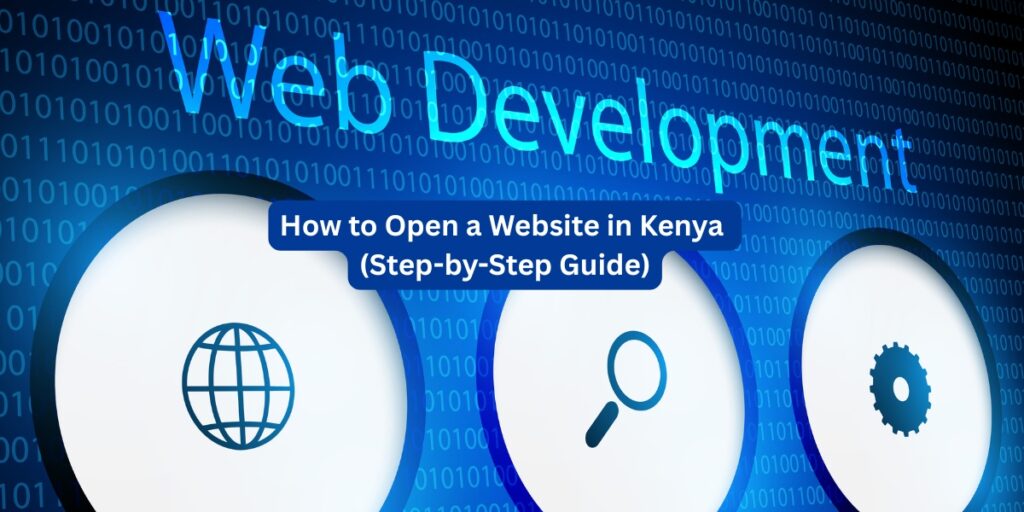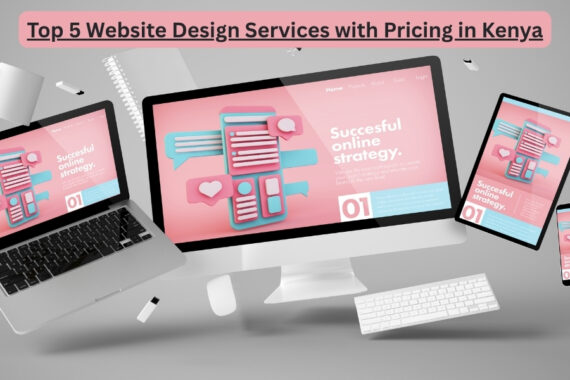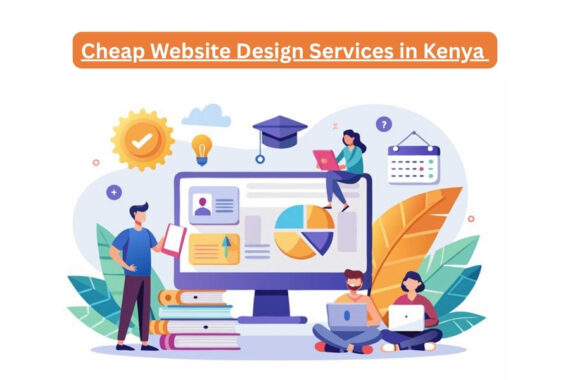Why Open a Website in Kenya?

In today’s digital-first world, having a website is no longer optional — it’s a necessity. Whether you’re running a small shop in Nakuru, a law firm in Nairobi, or a non-profit in Eldoret, a professional website is your 24/7 sales rep, brand ambassador, and customer support assistant all rolled into one.
In this guide, I’ll walk you through exactly how to open a website in Kenya, the costs involved, and practical tips on marketing it once it goes live.
Let’s start with the benefits of creating a website:
Visibility & Reach – Your business is no longer limited to your town or city. A website allows you to reach customers across Kenya and even globally.
Build Trust – People trust businesses with professional websites more than those without one.
Increased Revenue – With SEO (search engine optimization), you can attract clients organically without paying for ads.
Convenience – Unlike a physical shop, a website never closes. Customers can buy or book anytime.
Answer Common Questions – Save time by publishing answers online instead of repeating the same info to every customer.
Communication Link – Share updates, promotions, and launches directly on your website.
💡 Example: A business in Nakuru that launched a simple 5-page business website started getting bookings online, saving time on phone calls and attracting new customers who found them via Google search.
What You Need to Start a Website in Kenya
Starting a website in Kenya is like building a house. You need four main things:
Domain Name – Your online address (e.g. feizel.com).
Hosting – Where your website “lives” online.
Website Design & Development – Building the actual site with pages, images, and content.
Continuous Improvement – Updating content, improving design, and tracking performance.
Three Ways to Create a Website in Kenya
When starting out, you have three main options:
1. Do It Yourself (DIY)
Thanks to tools like WordPress, Wix, Shopify, and AI website builders, you don’t need coding skills. Think of them as building blocks — you drag, drop, and arrange until you get the design you want.
Pros:
Cheaper than hiring.
Full creative control.
Easy to update anytime.
Can become a side hustle (build for others).
Cons:
Time-consuming.
Risk of amateur design.
SEO and security often overlooked.
💡 Example: A freelancer in Nairobi used WordPress to launch their portfolio site for just under Ksh 8,000, but later hired a professional to improve SEO because they weren’t ranking.
2. Hire a Freelancer
This is my recommended option for most businesses. A skilled freelancer (like Feizel.com) combines design, SEO, and marketing knowledge.
Why this matters: A website is like a toolbox — if some tools are missing (like SEO setup, Google Analytics, or security), it won’t perform well even if it looks nice.
Benefits of a freelancer:
Saves time — site done in 1–2 weeks.
More affordable than agencies.
Personalized guidance.
SEO fundamentals included.
Fast Google ranking with the right setup.
💡 Example: A local ISP in Gilgil hired a freelancer to create their site. Within a month, they ranked for “internet provider in Gilgil” without paid ads and started receiving daily inquiries.
3. Hire an Agency
Agencies can deliver high-quality websites but often come with higher costs due to overheads like staff and office rent.
Pros:
Access to a full team.
Good for complex corporate sites.
Cons:
Expensive (Ksh 30,000 – 150,000+).
Slower turnaround.
Less personal attention.
Step 1: Choose a Domain Name
Your domain is your digital identity. It should be:
Short and memorable.
Relevant to your business.
Easy to spell.
Kenyan Domain Costs:
.co.ke→ Ksh 1,300/year.com→ Ksh 1,500–2,000/year
💡 Pro Tip: At Feizel.com, we offer a free .co.ke domain when you purchase a web design package.
Step 2: Get Reliable Hosting
Hosting is where your site “lives” online. Don’t just choose the cheapest provider — your hosting affects speed, uptime, and security.
What to look for in hosting:
99.9% uptime guarantee (so your site is always live).
Free SSL certificate (adds the padlock for security).
Automatic backups (saves your data).
24/7 support (vital if something breaks).
Costs in Kenya:
Shared hosting: Ksh 500/month – Ksh 6,000/year
Business hosting: Ksh 8,000 – 15,000/year
💡 Pro Tip: At Feizel.com, we offer free 1 year hosting when you purchase a web design package.
Step 3: Design and Customize Your Website
This is the creative stage where you bring your vision to life.
Pages every business website should have:
Home
About Us
Services/Products
Blog/News
Contact Us
💡 Example: A dental clinic in Nairobi used its About Us page to highlight doctor credentials, instantly building trust with new patients.
Step 4: Content Creation
“Content is king.” Your website should not just look good — it should provide value.
Types of content to create:
Blog posts answering customer questions.
Service pages explaining what you offer.
Testimonials to build trust.
FAQs to reduce customer doubts.
💡 Example: A car wash in Nakuru wrote blogs like “Best Car Wash in Nakuru” and started ranking on Google within weeks.
How Much Does It Cost to Create a Website in Kenya?
| Option | Cost (Ksh) | Best For |
|---|---|---|
| Do It Yourself | 2,500 – 8,000 | Freelancers, personal blogs |
| Hire a Freelancer | 15,000 – 26,500 | Small businesses, NGOs |
| Hire an Agency | 30,000 – 150,000+ | Large companies |
Marketing Your New Website (For Free)
Once your website is live, you need traffic. Here are simple strategies:
Optimize your homepage with keywords.
Add all important pages to header/footer navigation.
Open social media accounts and interlink them.
Join online forums/groups and share helpful knowledge.
Use email marketing to build client relationships.
Try video content on YouTube and TikTok.
Write blogs answering common customer questions.
Submit your site to Google Search Console.
10 Frequently Asked Questions (FAQs)
Q1: How much does it cost to start a website in Kenya?
Anywhere from Ksh 5,000 (simple portfolio) to Ksh 26,500 (business/e-commerce) and above.
Q2: How long does it take to build a website?
Most sites are ready in 7–14 days, depending on complexity.
Q3: Do I need coding skills to create a website?
No — tools like WordPress, Wix, and Shopify allow you to build without coding.
Q4: Can I get a free website?
Free website builders exist, but they often limit features and show ads. A custom domain and hosting are more professional.
Q5: What’s the best domain for Kenyan businesses?
.co.ke is affordable and trusted locally.
Q6: Do you provide hosting and domain with your packages?
Yes — we provide free domain registration and hosting setup with business and e-commerce websites.
Q7: How can I accept payments online?
With our e-commerce package, you get M-Pesa integration and optional WhatsApp checkout.
Q8: Can I redesign my old website instead of starting fresh?
Yes — our website redesign services (from Ksh 15,000) upgrade outdated websites.
Q9: Will my website work on mobile?
Yes — all sites we design are mobile-friendly and responsive.
Q10: How do I get my website on Google?
By setting up Google Search Console, SEO optimization, and regular content updates.
Conclusion
Opening a website in Kenya is one of the smartest business moves you can make. With the right domain, hosting, and professional design, your site can become a lead-generating, revenue-boosting machine.
At Feizel.com, we help Kenyan businesses build affordable, high-quality websites that deliver results. Whether you need a portfolio, business, or e-commerce site, we’ve got you covered.
📞 Call/WhatsApp us today: 011 2690250
👉 Or visit our Homepage to get started now.


